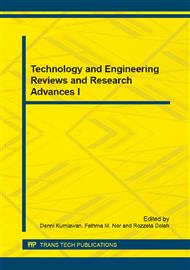p.128
p.141
p.145
p.149
p.154
p.159
p.163
p.168
p.177
Performance Appraisal Amongst Contractors in Construction Project in Malaysia
Abstract:
Contractors are one of the important parties in completing a construction project as they directly involved in the construction works execution. Therefore, contractors’ performance should be monitored and assessed on a regular basis to ensure the success of the project, particularly by identifying the failures and shortfalls, as well as any delays and losses that might occur due to the poor productivity of the contractors. A systematic performance appraisal is one of the endeavours in ensuring that the contractors’ performance is as per the expectation of the stakeholders, particularly the client. Hence, this paper provides a review on the contractors’ performance appraisal practices in construction industry in Malaysia. Questionnaire survey on 214 respondents from construction industries, ranging from contractors to project managers, was undertaken where the results showed that contractors’ performance appraisal in a particular construction project is very essential as it drives the project towards better improvement and ultimate success.
Info:
Periodical:
Pages:
154-158
DOI:
Citation:
Online since:
February 2015
Authors:
Keywords:
Price:
Сopyright:
© 2015 Trans Tech Publications Ltd. All Rights Reserved
Share:
Citation:


